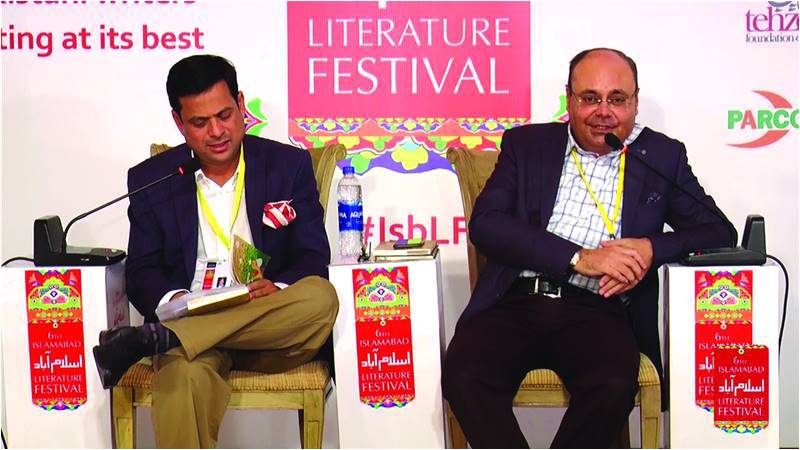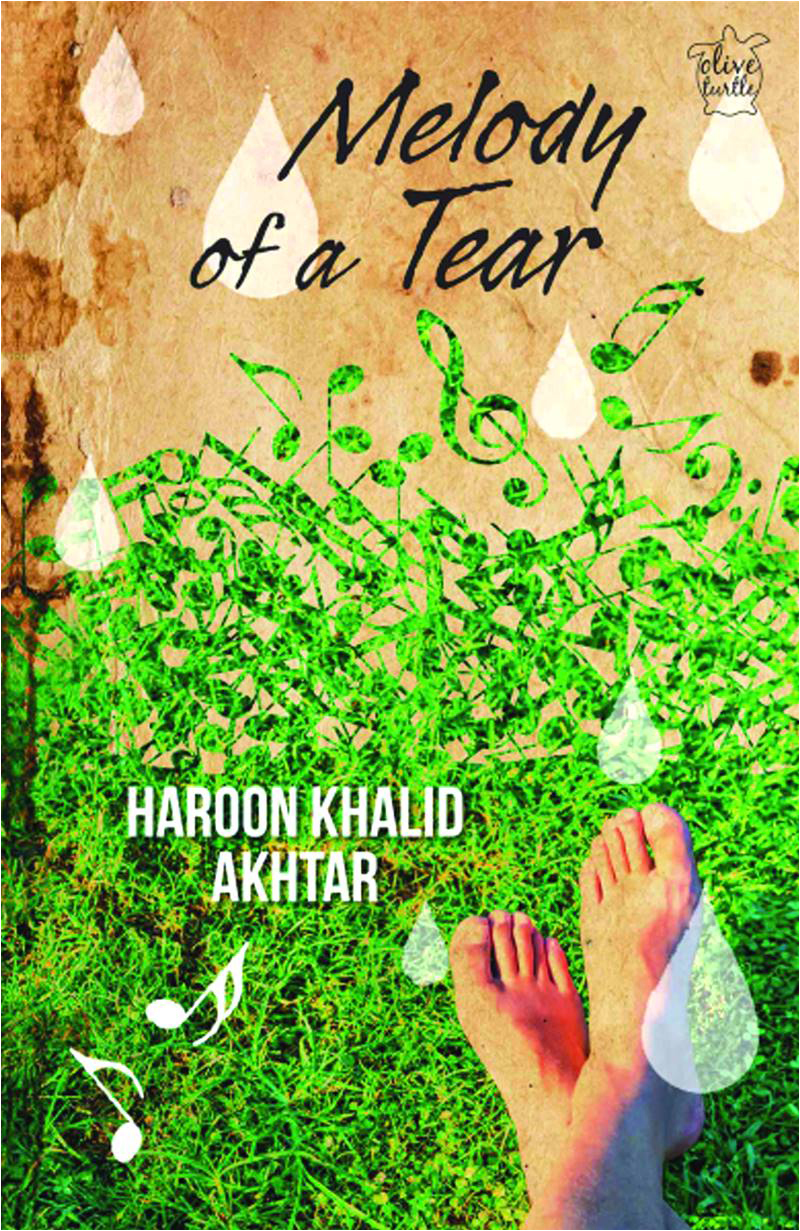
I ended up with a signed copy of Melody of a Tear, Haroon Khalid Akhtar’s debut novel, thanks to a friend. The author is a banker by profession and writer by passion. Though this is his first novel, Akhtar’s writing career spans over a decade, in which he has been writing articles and short stories for Dawn, which he later compiled in a book titled Threadbare.
Raised amongst books collected by his father, Mohammad Khalid Akhtar, a distinguished Urdu writer and avid reader, the literary world is not a new environment for him.
The story revolves around three main characters Zara, Zahid and Waris – where the title of the protagonist is held by Zara. And no, this is not your clichéd love triangle saga with a predictable ending. Far from it. These three individuals, and all the others that you come across through them, are linked by the fascination that the protagonist has with tears.
Tears chastened women and humanized men, as Zara puts them. Raised like the second son of the family, since her birth, she ends up with a deep identity crisis that drives her to the point of suicide and an inability to cry like a normal human being.
Visiting the library is her safe place and that is where she sees a familiar face from her student days, hunched over a newspaper with tears in his eyes. A man crying in a public space. This is the reader’s introduction to Zahid, his quiet and empathetic personality that gives him the ability to willing be at places that are marginalized by society at large.

Curiosity pushes Zara to chase this tear and her search leads her to the Sufaid Kothi, where she gets to meet Waris, a lonely mystery writer for children and his home becomes safe haven for the three of them to be able to be themselves, without wearing any socially-approved personality traits. The house also serves as a roof over Sheila and her four sons, who form the backdrop of the house and its happenings.
In Melody of a Tear, for both the lead characters and the supporting ones, Akhtar has very skillfully touched upon ideas and themes that impact our society on the whole. There are lines that capture some key stereotypes:
Perhaps the truest religion of the world has always been poverty, the most ancient, the most widespread, the most enduring, which did not discriminate, made everybody thank God profusely for every meal and kept them safe from hedonism.”
Over a short email interview, I asked him to share his inspiration behind the novel and he explains that the book sets a high bar for compassion, sacrifice and friendship – themes that are a source of inspiration for him. These themes were the collection of building blocks that affected him and helped him in discovering this story.
“While writing, I did not plan out the plot, just trusted and anchored on some concept close to my heart. And plot kept coming as I wrote page by page. While I rewrote the pages countless times, the changes were mainly to do with tightening the prose, not much in the way of plot changes. The twists and the ending dawned on me in the flow. In the end it turned out to be a book of extremities. I wanted to observe Zaid from a feminine perspective. Hence Zara’s first-person narrative. The novel needed its sanity and orchestrator. Hence Waris invented himself. Yes, it was not my doing, trust me. He barged in.”
Mark Twain said that truth is stranger than fiction, but it is because fiction is obliged to stick to possibilities and truth isn’t. Akhtar has with great skill fictionalized the strange complexities of reality, weaving an intertwined delicate storyline that keeps you hooked from the start. There are no simple answers, no black-and-white categories. The grey shades of life are strewn about in a magic realist format, where the questions building up in the narrative are as surreal as their answers.
“I believe good writing is about inciting feelings. For that a writer must search within him or her the moving moments or instances in life. While writing, I discovered that much of this raw material resided in my subconscious, a rich ocean of faded memories that defined me. I journeyed back in time to find and understand these aspects. The answers lay in my early childhood at Multan and Lahore. I am glad I dug out Bahadur and gave him a life.”
The Bahadur mentioned in the above quote comes as a surprise package for the reader at the peak of the story when one is thinking that they have a grasp of how the ending is going to unfold. So I am not going to go into details about him: the reader must resort to the book for this.
One is bound to end up agreeing with Mohammed Hanif’s opinion that the author has “an utterly original voice and a brilliant imagination”.
Another aspect that stands out about this story is that despite your mind constant signaling to pinpoint a “villain”, you simply won’t be able to. As it turns out, this is a conscious effort on behalf of the author. He explains why his story doesn’t have an obvious villain:
“All humans have their perspectives created by circumstances and experiences. At times injustice starts right at the time of birth. All humans spend lifetimes understanding themselves and fail. We have surges of good and bad. I see humans as the product and victims of this enormous complexity which leads us astray. That is how a higher intelligence will look at us. One should only sympathize with victims and not blame them. All humans are forgivable and redeemable. The moral flame never entirely extinguishes.”
It is the sort of story that will stay with you for a long time and I hope that Haroon Khalid Akhtar continues to add to Pakistan’s literature.
Fatima Arif is a digital communications and marketing professional. She tweets at @FatimaArif
Raised amongst books collected by his father, Mohammad Khalid Akhtar, a distinguished Urdu writer and avid reader, the literary world is not a new environment for him.
The story revolves around three main characters Zara, Zahid and Waris – where the title of the protagonist is held by Zara. And no, this is not your clichéd love triangle saga with a predictable ending. Far from it. These three individuals, and all the others that you come across through them, are linked by the fascination that the protagonist has with tears.
Tears chastened women and humanized men, as Zara puts them. Raised like the second son of the family, since her birth, she ends up with a deep identity crisis that drives her to the point of suicide and an inability to cry like a normal human being.
Visiting the library is her safe place and that is where she sees a familiar face from her student days, hunched over a newspaper with tears in his eyes. A man crying in a public space. This is the reader’s introduction to Zahid, his quiet and empathetic personality that gives him the ability to willing be at places that are marginalized by society at large.

Curiosity pushes Zara to chase this tear and her search leads her to the Sufaid Kothi, where she gets to meet Waris, a lonely mystery writer for children and his home becomes safe haven for the three of them to be able to be themselves, without wearing any socially-approved personality traits. The house also serves as a roof over Sheila and her four sons, who form the backdrop of the house and its happenings.
In Melody of a Tear, for both the lead characters and the supporting ones, Akhtar has very skillfully touched upon ideas and themes that impact our society on the whole. There are lines that capture some key stereotypes:
Perhaps the truest religion of the world has always been poverty, the most ancient, the most widespread, the most enduring, which did not discriminate, made everybody thank God profusely for every meal and kept them safe from hedonism.”
Over a short email interview, I asked him to share his inspiration behind the novel and he explains that the book sets a high bar for compassion, sacrifice and friendship – themes that are a source of inspiration for him. These themes were the collection of building blocks that affected him and helped him in discovering this story.
“While writing, I did not plan out the plot, just trusted and anchored on some concept close to my heart. And plot kept coming as I wrote page by page. While I rewrote the pages countless times, the changes were mainly to do with tightening the prose, not much in the way of plot changes. The twists and the ending dawned on me in the flow. In the end it turned out to be a book of extremities. I wanted to observe Zaid from a feminine perspective. Hence Zara’s first-person narrative. The novel needed its sanity and orchestrator. Hence Waris invented himself. Yes, it was not my doing, trust me. He barged in.”
Mark Twain said that truth is stranger than fiction, but it is because fiction is obliged to stick to possibilities and truth isn’t. Akhtar has with great skill fictionalized the strange complexities of reality, weaving an intertwined delicate storyline that keeps you hooked from the start. There are no simple answers, no black-and-white categories. The grey shades of life are strewn about in a magic realist format, where the questions building up in the narrative are as surreal as their answers.
“I believe good writing is about inciting feelings. For that a writer must search within him or her the moving moments or instances in life. While writing, I discovered that much of this raw material resided in my subconscious, a rich ocean of faded memories that defined me. I journeyed back in time to find and understand these aspects. The answers lay in my early childhood at Multan and Lahore. I am glad I dug out Bahadur and gave him a life.”
The Bahadur mentioned in the above quote comes as a surprise package for the reader at the peak of the story when one is thinking that they have a grasp of how the ending is going to unfold. So I am not going to go into details about him: the reader must resort to the book for this.
One is bound to end up agreeing with Mohammed Hanif’s opinion that the author has “an utterly original voice and a brilliant imagination”.
Another aspect that stands out about this story is that despite your mind constant signaling to pinpoint a “villain”, you simply won’t be able to. As it turns out, this is a conscious effort on behalf of the author. He explains why his story doesn’t have an obvious villain:
“All humans have their perspectives created by circumstances and experiences. At times injustice starts right at the time of birth. All humans spend lifetimes understanding themselves and fail. We have surges of good and bad. I see humans as the product and victims of this enormous complexity which leads us astray. That is how a higher intelligence will look at us. One should only sympathize with victims and not blame them. All humans are forgivable and redeemable. The moral flame never entirely extinguishes.”
It is the sort of story that will stay with you for a long time and I hope that Haroon Khalid Akhtar continues to add to Pakistan’s literature.
Fatima Arif is a digital communications and marketing professional. She tweets at @FatimaArif

